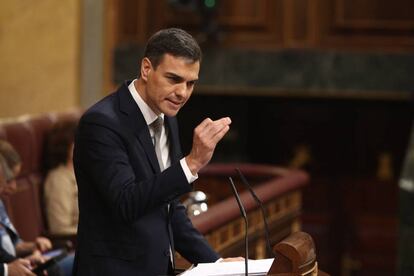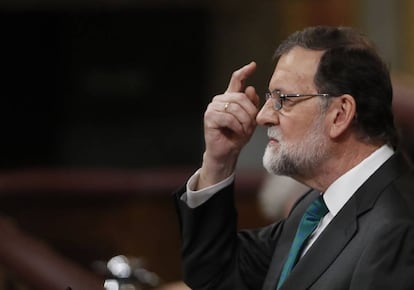No-confidence motion in Spain: “Resign, Mr Rajoy, and it will all be over”
Two-day debate will end with a vote that could unseat the conservative PM from power

Prime Minister Mariano Rajoy addressed Congress on Thursday morning in what could be one of his last appearances as head of the Spanish government if a no-confidence vote against him prospers.
The lower house is currently debating a motion filed by the main opposition Socialist Party (PSOE) that is seeking to unseat the conservative PM and replace him with their own leader, Pedro Sánchez. The debate will run throughout Thursday and Friday morning, when deputies will vote on whether to keep or oust Rajoy.
Sánchez urged Rajoy to step down while he still can before his leadership is put to the vote tomorrow. The Socialists, who need an absolute majority of 176 votes to succeed but only hold 84 seats in Congress, have been racing to secure support from a wide range of smaller parliamentary forces with varying agendas – including Basque nationalists and separatist Catalan parties – making the outcome of the no-confidence vote anything but certain.
Opportunistic
As he took the podium, Rajoy, 63, sought to portray the no-confidence vote as an opportunistic act by the PSOE, one that is lacking the legitimacy of the polls.
“You have to become the head of government the way the rest of us did, by winning an election,” he told Sánchez, who was waiting his own turn to speak. “That’s the reasonable thing to do when you’re talking about a democracy. Could we truthfully call this a case of opportunism?
“Mr Sánchez is concerned because he is not doing any better in the polls, and he has realized that he will never reach government through elections,” Rajoy continued. “That is why he figured that this would resolve all his problems in a single move,” he said, alluding to the PSOE’s poor showing at the last two general elections.
The PM also downplayed the relevance of a recent court ruling that triggered the no-confidence motion, and accused the Socialists of offering “a manipulated version” of the verdict. He insisted that the sentence in the Gürtel case – an investigation into a massive kickbacks-for-contracts network that has plagued the PP in recent years – did not find the party guilty of any crimes: “It only established a civil liability over events that took place at two municipalities 15 years ago,” Rajoy argued.

On Thursday of last week, a court handed down sentences to 29 people with ties to the PP for embezzlement, tax evasion and other crimes related to Gürtel. The PP itself was slapped with a heavy fine after judges found that it had benefited from the corruption scheme.
“The justification for all this is not a court ruling, nor that you yourselves are champions of having clean hands...,” said Rajoy. “Tell us, why are four courts investigating the Valencia socialists? Can you boast about zero corruption? This is just about Mr Sánchez’s ambitions. His only clear idea is that he needs to be the PM... but for how long, and to do what?”
Rajoy also underscored his administration’s good performance on the economic front. “After five years of recession, Spain has been leading European growth rates for nearly as many years. What’s the damage that my party is causing this country?”
“Resign now”
Speaking after Rajoy, Socialist Party leader Pedro Sánchez urged the prime minister to step down voluntarily while he still can.
“Resign, Mr Rajoy, and it will all be over [...]. Your time is up,” said Sánchez, 46. “Resign and this no-confidence motion will end here and now. The time has come, there is no middle-of-the-road way to raise the quality of our democracy, which is now being questioned.”
What’s the damage that my party is causing this country? Prime Minister Mariano Rajoy
The opposition leader suggested that, if successful, he would seek to implement sweeping policies before calling early elections.
“I appeal to all deputies in this chamber because of the unavoidable necessity of this no-confidence motion, and because an opportunity is opening up that deserves to be explored, in order to articulate a basic consensus, to address social and territorial emergencies, and once this has been achieved, to call a national election so that citizens can decide on the road map for this country.”
Sánchez also pledged to honor the recently approved budget if he wins the no-confidence vote, despite having opposed it earlier this month. Given that it is currently in a minority government, the PP saw its economic blueprint go through Congress with the support of the Basque Nationalist Party (PNV), whose five deputies could also determine the success or failure of tomorrow’s vote.
Circle of corruption
Day one of the debate opened with an address by PSOE organization secretary José Luis Ábalos, who said that the decision to file the motion was triggered by the corruption of the ruling party.
“Through your use of power, you created a veritable circle of corruption,” said Ábalos, citing the recent verdict in the Gürtel case as the trigger for the no-confidence vote. “We have long lived in the universe of ‘presumed innocent,’ but that period is over. The ruling demands accountability.”
Despite widespread condemnation of the PP over its ties to Gürtel and other corruption cases, the Socialist representative also found himself on the defensive on Thursday, as he sought to justify a potential Sánchez administration despite his poor performance at the last two elections.
“The Socialist Party is being told that it wants to reach government at any price. That’s not true. We want to do it according to the Constitution. This is what democracy is all about,” said Ábalos. “Some people have dared to describe our candidate as an enemy of the rule of law, as a traitor.”
Whatever the outcome of the vote, the motion has undermined the unity that the PP and Socialists had shown to date in connection with the Catalan crisis, particularly the decision to impose direct rule over the region under Article 155 of the Constitution, which was implemented in the wake of the passing last year of a unilateral declaration of independence in the regional government.
The political turmoil in Spain comes on the heels of similar instability in Italy. The markets in both countries have been feeling the effects in recent days with tumbling markets, and increased borrowing costs.
This is a developing story that will be updated throughout the day.
English version by Susana Urra.
Tu suscripción se está usando en otro dispositivo
¿Quieres añadir otro usuario a tu suscripción?
Si continúas leyendo en este dispositivo, no se podrá leer en el otro.
FlechaTu suscripción se está usando en otro dispositivo y solo puedes acceder a EL PAÍS desde un dispositivo a la vez.
Si quieres compartir tu cuenta, cambia tu suscripción a la modalidad Premium, así podrás añadir otro usuario. Cada uno accederá con su propia cuenta de email, lo que os permitirá personalizar vuestra experiencia en EL PAÍS.
¿Tienes una suscripción de empresa? Accede aquí para contratar más cuentas.
En el caso de no saber quién está usando tu cuenta, te recomendamos cambiar tu contraseña aquí.
Si decides continuar compartiendo tu cuenta, este mensaje se mostrará en tu dispositivo y en el de la otra persona que está usando tu cuenta de forma indefinida, afectando a tu experiencia de lectura. Puedes consultar aquí los términos y condiciones de la suscripción digital.








































